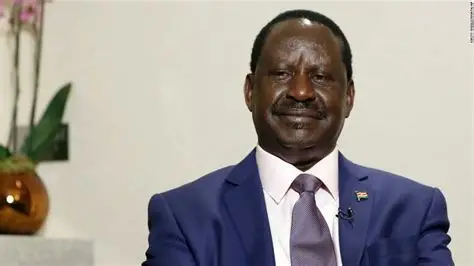NAIROBI — October 15, 2025 – Lenzwa.com Kenya is in mourning following the death of former Prime Minister Raila Odinga, one of the country’s most influential and enduring political figures. Odinga passed away at the age of 80 while receiving medical treatment in Kochi, India, a senior official from his office confirmed to Reuters on Wednesday.
According to a report by Mathrubhumi, a respected Indian newspaper, Odinga suffered a cardiac arrest early Wednesday morning. Despite emergency efforts to revive him at a local hospital in southern India, he was pronounced dead shortly after arrival.
No official statement has yet been released by Odinga’s family or the Kenyan government. However, news of his passing has already prompted a wave of tributes from across the political spectrum and from global leaders, recognizing his pivotal role in shaping modern Kenyan politics.

A Lifelong Champion of Democracy
Raila Odinga was not just a politician—he was a symbol of resistance, reform, and resilience. A key figure in Kenya’s democratic transition, Odinga played a leading role in ending one-party rule in the early 1990s and in establishing a more inclusive and transparent political system.
Born in 1945 in Maseno, western Kenya, Raila was the son of Jaramogi Oginga Odinga, Kenya’s first vice president and a founding father of the nation. Following in his father’s political footsteps, Raila built his own legacy—often at great personal and political cost.
He was a central figure in the struggle that led to the legalization of multiparty democracy in 1991, marking a turning point in Kenya’s political history. Two decades later, he played a crucial role in securing the adoption of Kenya’s new constitution in 2010, which introduced far-reaching reforms to governance, civil rights, and devolution.
Five Presidential Bids, One National Icon
Despite his towering presence in Kenyan politics, Odinga never ascended to the presidency. He ran for the office five times—in 1997, 2007, 2013, 2017, and 2022—and lost on each occasion, often under highly disputed circumstances.
His most controversial defeat came in 2007, when widespread allegations of vote rigging led to post-election violence that claimed the lives of over 1,300 people and displaced hundreds of thousands. Kenya was brought to the brink of collapse.
In a bid to stabilize the nation, Odinga agreed to form a coalition government with then-President Mwai Kibaki, taking the newly created post of Prime Minister in 2008—a position he held until 2013. It was a rare moment of compromise that demonstrated his commitment to peace, even in the face of personal political loss.
A Legacy of Protest and Persistence
Odinga’s political life was defined not only by high office but also by public defiance and activism. He was frequently arrested, detained without trial, and exiled for challenging authoritarian regimes in the 1980s and 1990s.
Even in his later years, Odinga continued to lead mass protests and civil action campaigns, most recently organizing the “Saba Saba People’s March” in July 2025—an anti-government demonstration demanding accountability and electoral reforms.
To millions of Kenyans, Odinga was more than a politician—he was “Baba” (Father), a symbol of hope and endurance. His passionate speeches, unwavering focus on justice, and populist charisma made him one of the most beloved and controversial figures in Kenyan history.
Nation in Mourning, World Pays Tribute
News of Odinga’s death has prompted an outpouring of grief. Local leaders, former presidents, and foreign dignitaries have issued statements of condolence, praising his contributions to democracy and governance.
As of this writing, the Kenyan government has not released official details on funeral arrangements or plans for a state memorial. However, given Odinga’s stature, a national mourning period and state honors are widely expected.
In Nairobi and Kisumu—his political stronghold—mourners have already begun gathering in the streets, holding vigils, and paying tribute to the man who shaped their political consciousness for more than four decades.
The End of an Era, The Beginning of a Legacy
Raila Odinga’s passing marks the end of an era in Kenyan politics. His influence spanned generations, and his presence shaped the country’s democratic journey in ways few others have.
Though he never held the presidency, his name will endure in Kenya’s history books as one of the most consequential political figures of the post-independence era. His life embodied the spirit of struggle, and his legacy will continue to inspire those who fight for justice, reform, and national unity.
As Kenya reflects on Odinga’s long journey—from activist to statesman—his words remain as relevant as ever:
“Freedom is not a gift; it is a right that must be fought for.” (LZ*)


Comments are closed.